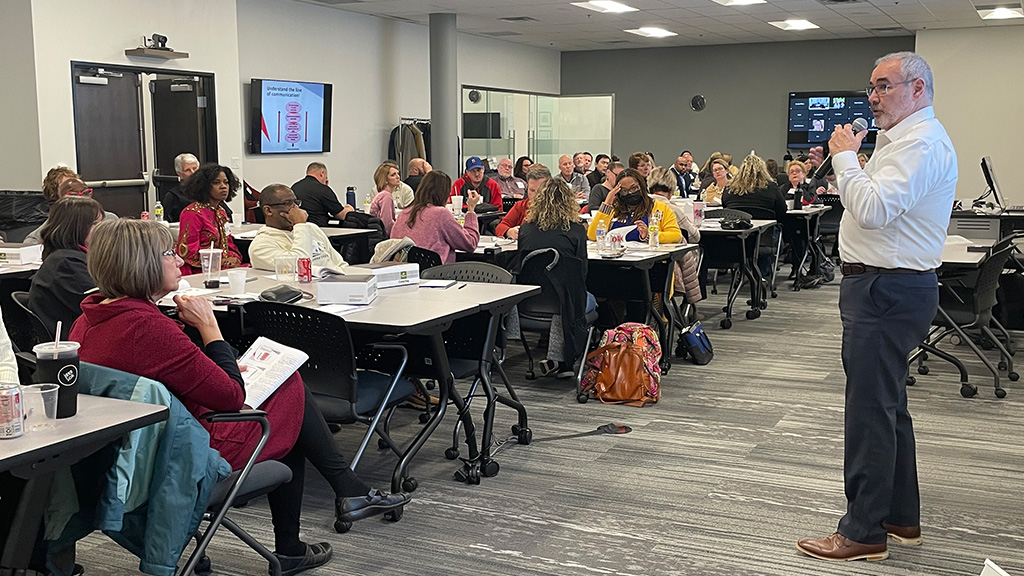
A PHOTO OF ATTENDEES TAKEN DURING THE INDIANA SCHOOL BOARDS ASSOCIATION’S 2023 STATEHOUSE DAY VISIT.
Attending NSBA’s annual conference in the not-too-distant past, I recall hearing then-NSBA Executive Director Thomas Gentzel say that K-12 public education has been and will continue to be a pillar of our nation’s democracy. I have contemplated his words and further embraced their significance. How true the importance of the success of public schools is to the success of our country and perpetuation of our form of governance.
By extension, the success of our public school districts in producing graduates who are prepared to succeed and ready to sustain our democracy is closely connected to the importance of a highly functioning governing body, that is, school boards. Tenets of model school board governance are core to the vision and mission of the Indiana School Boards Association (ISBA). Our vision is to be Indiana’s premier resource in school governance and a respected advocate of public education. Our mission is to support our members with the resources necessary for excellence in local school board governance.
Achieving and sustaining effective board governance practices should be a continuous pursuit requiring commitment, collaboration, and resolve. They require participation in team-building activities, as well as individualized board member training and professional development. In 2022, the ISBA board of directors adopted a three-year strategic plan to support our members in the pursuit of exemplary board service.
We were intentional in 2023 to execute the plan’s strategies to enhance and elevate this work. This resulted in our delivery of many core service activities and 44 events held by ISBA. I will spotlight three programs or service areas that have practical applications for school board members throughout the U.S., whether you are a first-term board member completing your first year or a veteran board member striving to do good work and focused on continuous improvement.
Become a best practice resource for members
One of the five goal areas of the 2022-25 ISBA Strategic Plan is for the association to “become a best practice resource for members.” Objectives of this goal include:
Provide timely and research-based guidance and resources on issues facing school districts and school boards.
Inform and guide members on best practice implementation of effective board governance principles, roles, responsibilities, and strategies.
Elevate the value of resources available in all core service areas.
In partial fulfillment of these objectives, ISBA, largely through the leadership of Steve Horton, director of board services, offered a New Board Member Academy to the more than 300 school board members elected to office during the November 2022 general election and who took office in January 2023.
Training for new board members
The New Board Member Academy was conceived and designed to give new school board members valuable, practical information and guidance to use immediately at the boardroom table. We wanted newly elected (and appointed) school board members to develop a better understanding of their roles and responsibilities to focus on making a difference for students. All-day foundational workshops began around the state in late January through February and were followed by a sequence of live clinic session webinars on key topics. The curriculum of the academy addressed boardsmanship, managing public meetings, communications, superintendent/board relations, policymaking, and budgeting and financial oversight. The norms and tenets described in both workshop and webinar content through a six-month program are principles that all members, regardless of tenure, should be committed to upholding, including:
The most important working norm and one that allows the concept of publicly elected board members to work is “No member has individual decision-making authority.” It is only when a board is convened at its public meetings that the board has authority to act on agenda items.
The best work boards can do is to diligently hire a superintendent, develop a strong working relationship with that person, and empower them to lead the daily operation of the school system.
The board’s work also is to develop a strong vision for the district and hold themselves and the superintendent accountable to that vision.
Each board member should seek to listen to understand, ask questions, and develop a strong culture of communication with your board colleagues and superintendent. Everyone should receive and share the same information.
Most importantly, honor confidentiality. It builds the essential element of trust that a board and its members need to collaborate effectively and thrive in your governance role.
ISBA expounds on these principles and tenets in its annual publication, Model of Board Governance: A Manual for Reference and Best Practices for School Board Members.
Budgeting and financial oversight: a core duty
In addition to the other statutory duties of the school board, the financial oversight of a school corporation and adoption of the annual budget are core responsibilities of every school board.
The superintendent, as CEO, is responsible for managing the day-to-day finances of a school district while keeping the board apprised of the corporation’s financial condition. School board members are entrusted by the community with financial resources for the education of children. Board members are expected to spend tax dollars in an efficient and responsible manner. Ultimately, the school board is accountable for ensuring the long-term financial solvency of the school corporation. To support school board members with this core duty, ISBA issued the 4th edition of the Budgeting and Financial Oversight for School Board Members Resource Guide in October.
This guide is intended to provide board members with a breadth of information and resources, including: an overview of state agencies, the annual financial calendar, state and local revenue sources, local expenditures, and internal financial accounting and reporting. It includes a monthly checklist to review and use regularly at board meetings. The guide also instructs boards on how to align the annual budget to the mission and vision of the district. The strategic plan should drive the budget priorities of the district. This oversight process becomes a sufficient review of “what we spend, how we spend, and when we spend it.” From an oversight perspective, board members need to ask the right questions and request and receive adequate financial data before making an informed decision and taking formal action.
Board members should ask the following questions about budgeting and finances:
Does the district have a well-defined, articulated vision and mission that drives financial decision-making?
Are fund balances easily identified and monitored?
Do board members understand the predictability of revenues and expenditures?
How much is the district spending each month?
Are board members mindful of potential one-time expenditures?
What is the potential impact of transfers to other funds on the general fund, and what is the availability of other funds to supplement the general fund, if needed?
Do board members agree on when rainy day funds may be expended?
Does the district have a three-year strategic plan on spending district resources?
Do board members understand the costs of collective bargaining agreements and insurance? What is the percentage amount being spent on salaries and benefits?
Are district resources tied to instructional and school improvement goals?
The answers to these questions will prepare and empower a school board to fulfill a primary oversight duty by ensuring the financial solvency of the school district.

ISBA DIRECTOR OF BOARD SERVICES STEVE HORTON LEADING THE 2023 NEW BOARD MEMBER ACADEMY.
PHOTOS COURTESY OF ISBA
Taking K-12 advocacy to the next level
Another goal area of our strategic plan to support the work of school board members is to take our K-12 advocacy to the next level. Board member participation has become necessary and important with the escalation of social and political challenges confronting K-12 public education.
Board members and advocates need to engage in advocacy to help inform, influence, and shape sound education policy in support of public education. State school boards associations and their members are more impactful when they stand united to support the mission of public schools.
Objectives of ISBA’s goal to “take K-12 advocacy to the next level” to support our members include:
Inform, influence, and shape sound governance policy for K-12 public education.
Increase members’ overall knowledge of the legislative process.
Equip members with effective techniques, strategies, and processes for grassroots advocacy and campaigns.
Enhance relationships with state government leaders, including policymakers and agency staff.
The voice of school board members should not be underestimated. Board members, like state legislators, hold positions of influence in your communities. You deal with a variety of issues at the local level on an ongoing basis and are a trusted source of information about education policy. It helps that legislators listen to their constituents back home, and when you contact them, they understand you’re on the front lines of education and can explain the impact of state-level policy decisions on your school community and students.
ISBA has developed and issued an annual advocacy guide to our school board members. The 2024 ISBA Advocacy Guide was released to members in December. The guide includes a list of “The Top 10 Tips of Effective Advocacy” that are strategies that can be used at the federal level in communicating with members of Congress or with state policymakers and legislators.
Consider these tips when engaging in advocacy at the federal or state level:
Tip 1: Know your area legislators. Research your legislators’ backgrounds, committee assignments and voting records on education issues.
Tip 2: Develop lines of communication and relationships of trust with your legislators. Routinely visit, write, and call them. Let them know you are a constituent.
Tip 3: Don’t overdo your lobbying. Be brief and know what you are talking about. Clearly and quickly explain your opposition or support for the issue you are contacting them about.
Tip 4: Show respect. Be positive. Remember to thank legislators for pro-public education votes and support of your state association’s legislative priorities. Conclude each communication with an expression of gratitude for their time.
Tip 5: Lobby with your real-life experience. Using local examples is your most persuasive tool.
Tip 6: Set priorities. When everything is important, nothing is important. Know your “ask” and focus your conversation on it.
Tip 7: Build a community coalition. Collaborate with others and shore up lobbying allies from your community to demonstrate broad support.
Tip 8: Remember the media. Get your message out to the press through letters to the editor, news releases, and social media posts that can influence your legislators and public opinion.
Tip 9: Be sensitive to partisan politics but always try to come across as nonpartisan. In politics, there are no permanent allies and no permanent adversaries.
Tip 10: Be reasonable and consider compromise on issues. Sometimes, simply informing legislators on your position will pay long-term dividends, even if you don’t immediately change their position.
The resources highlighted here, and the many others provided by ISBA, support school board members in the pursuit of model board governance. The key to becoming an effective board member is to be patient, be prepared, ask questions, and remember that this pursuit is a continuous effort. School board members who focus on informed and ethical leadership are able to not only make popular decisions but also are unafraid to make the difficult ones.
Thank you for your dedicated and committed public service focused on children and best wishes to you in 2024 for this essential work.
Terry Spradlin (tspradlin@isba-ind.org) is the executive director of the Indiana School Boards Association.

Share this content